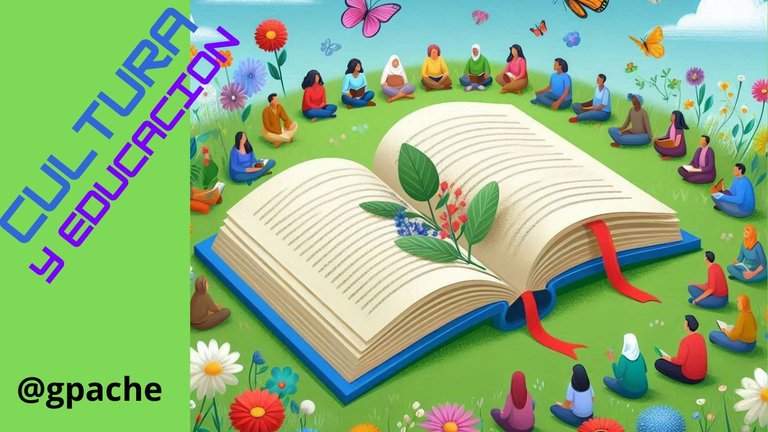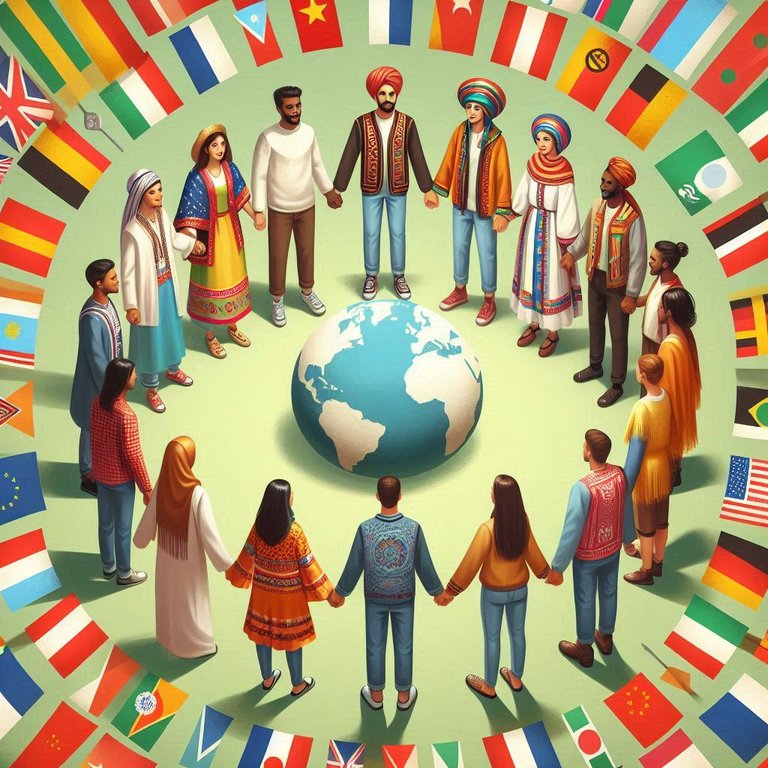Cultura y educación / Culture and education
Saludos queridos amigos de @humanitas, con esta publicación estoy siguiendo la guía mensual propuesta por nuestro amigo @eudemo y para este día viernes corresponde el tema "tu cultura".

Debo aclarar antes de comenzar, que las reflexiones que hago respecto a este tema son de mi exclusividad y no necesariamente debes estar de acuerdo con mi postura. Simplemente me baso en mi experiencia de vida y conocimientos adquiridos.
Los términos cultura y educación van siempre entrelazados, o al menos eso sería lo ideal para que la formación de las personas esté completa.
La educación no debe limitarse a enseñar una serie de conocimientos básicos de varias materias, sino que debe ser una formación integral, donde se eduque a la persona a ser más humana. Esto se logra cambiando la concepción de los pensums de estudio para incluir en él una serie de actividades dirigidas al desarrollo cultural del individuo, tales como talleres donde se eduque para la igualdad social, comunicación asertiva, análisis de la realidad del pais, entre otras tantas cosas que pueden ayudar a integrar al individuo a la sociedad.

No necesariamente una persona culta es una persona con un título universitario; me he topado con personas en la calle que sin haber estudiado, son capaces de entablar y mantener una conversación sobre cualquier tema actual y con una claridad asombrosa.
Esto me pasó mientras esperaba a mi esposa frente a un conocido centro comercial de la ciudad. Yo estaba de pie al lado de una panadería del este muy concurrida y había una persona sentada en el suelo ofreciendo alguna mercancía y comenzó a conversar conmigo. Enseguida noté que tenía mucha seguridad al hablar y se expresaba en una forma clara y precisa.
El caso es que al final de la conversación me reveló que a él le encantaba escribir, porque su papá le había inculcado el hábito de la lectura y ya había escrito tres libros. Además dominaba muy bien el inglés. Por supuesto al principio dudé de tal aseveración pero él, al darse cuenta de mi duda me dijo que estaba trabajando como vendedor ambulante porque nadie apreciaba el talento de los escritores y me mostró un certificado de los cursos de inglés que había realizado.

Eso demuestra la importancia de que el hogar se convierta en la primera escuela, donde se hable sin tapujos de valores y se formen las conciencias en los hijos.
Otro ejemplo muy claro lo encontramos cuando la gente emigra a otro país. Se va con su maleta llena de malas costumbres y hábitos inadecuados para adaptarse a otra sociedad que es intolerante a esta forma de actuar.
Allí el emigrante, si quiere quedarse, debe adecuarse a las costumbres y leyes del país y abandonar lo aprendido porque allá no le sirve. De lo contrario va a formar parte de las personas que se dedican a cometer actos delictivos contribuyendo a enlodar la imagen del país que representan.
También hay cosas positivas que la transculturacion ha traído. Como por ejemplo la variedad en el campo de la gastronomía. Todos los ricos platos que han traído los emigrantes y que enriquecen la cocina del país.
Hay muchos países donde nadie conocía las arepas, las empanadas y las cachapas venezolanas y ahora las disfrutan y hasta las preparan.
Además de otros avances en la medicina,ciencia, tecnología, artes e ingeniería.
En conclusión, la formación ideal de una persona se obtiene cuando la educación comienza en el hogar y va enfocada hacia el fomento de todo lo que tiene ver con lo cultural, ya que sin cultura no hay sociedad.

Imágenes generadas usando Bing
Portada diseñada con Canva
Texto traducido con Deepl
Versión en Inglés
Culture and education
Greetings dear friends of @humanitas, with this publication I am following the monthly guide proposed by our friend @eudemo and for this day Friday corresponds the theme “your culture”.

I must clarify before I start, that the reflections I make on this topic are my exclusive and not necessarily you must agree with my position. I simply base them on my life experience and acquired knowledge.
The terms culture and education are always intertwined, or at least that would be ideal for the formation of people to be complete.
Education should not be limited to teaching a series of basic knowledge of various subjects, but should be an integral formation, where the person is educated to be more human. This is achieved by changing the conception of the curriculum to include in it a series of activities aimed at the cultural development of the individual, such as workshops where they are educated for social equality, assertive communication, analysis of the reality of the country, among many other things that can help integrate the individual to society.

Not necessarily a cultured person is a person with a university degree; I have come across people in the street that without having studied, are able to engage and maintain a conversation on any current topic and with an amazing clarity.
This happened to me while I was waiting for my wife in front of a well-known shopping mall in the city. I was standing next to a busy eastern bakery and there was a person sitting on the floor offering some merchandise and began to converse with me. I immediately noticed that he was very confident in his speech and expressed himself in a clear and precise manner.
At the end of the conversation, he revealed to me that he loved to write, because his father had instilled in him the habit of reading and he had already written three books. He also had a very good command of English. Of course at first I doubted this assertion but he, realizing my doubt, told me that he was working as a traveling salesman because no one appreciated the talent of writers and showed me a certificate of the English courses he had taken.

This shows how important it is for the home to become the first school, where values are discussed openly and children's consciences are formed.
Another very clear example is when people emigrate to another country. They leave with their suitcase full of bad habits and inadequate habits to adapt to another society that is intolerant to this way of acting.
There the emigrant, if he wants to stay, must adapt to the customs and laws of the country and abandon what he has learned because it is of no use to him there. Otherwise, they will become part of the people who commit criminal acts and contribute to tarnish the image of the country they represent.
There are also positive things that transculturation has brought. As for example the variety in the field of gastronomy. All the rich dishes that the emigrants have brought and that enrich the cuisine of the country.
There are many countries where nobody knew the Venezuelan arepas, empanadas and cachapas and now they enjoy them and even prepare them.
In addition to other advances in medicine, science, technology, arts and engineering.
In conclusion, the ideal formation of a person is obtained when education begins at home and is focused on the promotion of everything that has to do with culture, because without culture there is no society.

Images generated using Bing
Cover designed with Canva
Text translated using Deepl
Posted Using InLeo Alpha